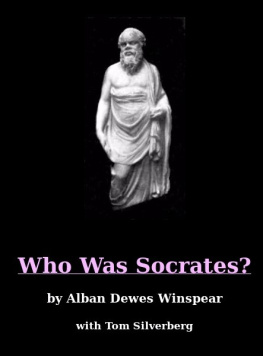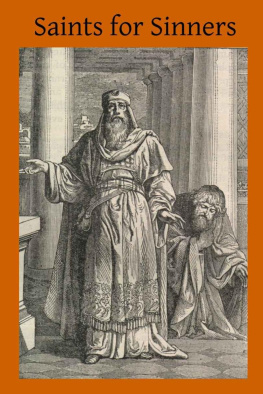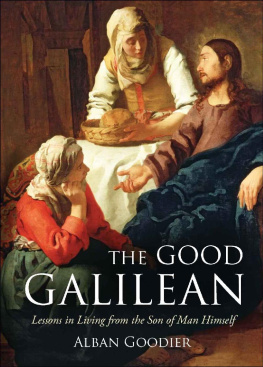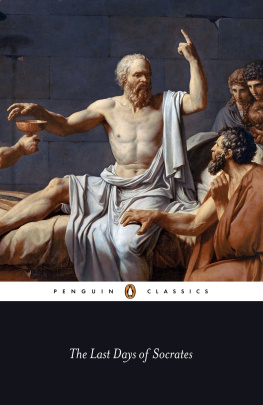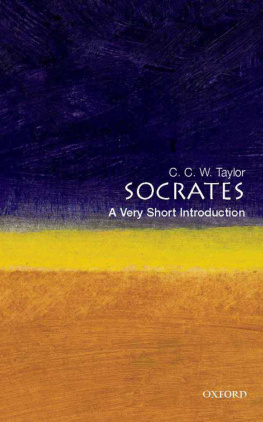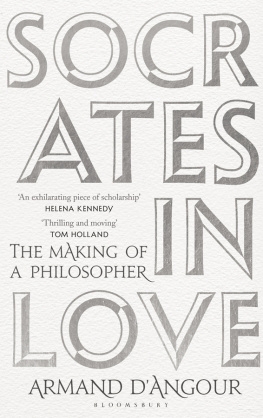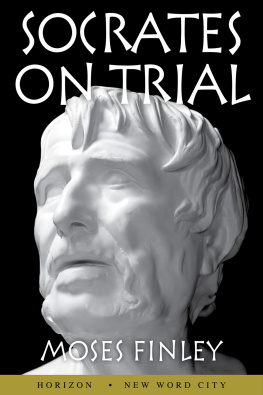Alban Dewes Winspear - Who Was Socrates?
Here you can read online Alban Dewes Winspear - Who Was Socrates? full text of the book (entire story) in english for free. Download pdf and epub, get meaning, cover and reviews about this ebook. City: Montclair, year: 1999, publisher: Montclair State University, genre: Science. Description of the work, (preface) as well as reviews are available. Best literature library LitArk.com created for fans of good reading and offers a wide selection of genres:
Romance novel
Science fiction
Adventure
Detective
Science
History
Home and family
Prose
Art
Politics
Computer
Non-fiction
Religion
Business
Children
Humor
Choose a favorite category and find really read worthwhile books. Enjoy immersion in the world of imagination, feel the emotions of the characters or learn something new for yourself, make an fascinating discovery.
- Book:Who Was Socrates?
- Author:
- Publisher:Montclair State University
- Genre:
- Year:1999
- City:Montclair
- Rating:4 / 5
- Favourites:Add to favourites
- Your mark:
- 80
- 1
- 2
- 3
- 4
- 5
Who Was Socrates?: summary, description and annotation
We offer to read an annotation, description, summary or preface (depends on what the author of the book "Who Was Socrates?" wrote himself). If you haven't found the necessary information about the book — write in the comments, we will try to find it.
Who Was Socrates? — read online for free the complete book (whole text) full work
Below is the text of the book, divided by pages. System saving the place of the last page read, allows you to conveniently read the book "Who Was Socrates?" online for free, without having to search again every time where you left off. Put a bookmark, and you can go to the page where you finished reading at any time.
Font size:
Interval:
Bookmark:
I first learned of Alban Dewes Winspear's brilliant Marxist studies in classics from afriend. When, one day in the mid-1980s, I asked Kevin Whitfield, who combined his job asprofessor of classics at several Boston-area universities with a commitment to politicalactivism, if he knew of any good Marxist studies of the Greek and Latin classics, Winspearwas the first name off his tongue. I had never heard of him.
Not long after that, I got and studied Winspear's major work, The Genesis ofPlato's Thought. Deeply impressed with the depth of Winspear's research and hismastery of Marxist analysis, I studied it over and over again. After that, I got and readall of Winspear's published books, including the present short work.
While visiting my father in Montreal in 1987, I met an old friend of Winspear's, aone-time student who was also brought out the last edition of The Genesis of Plato'sThought. From him I learned a little of Winspear's life, and of the influence hisworks had enjoyed until the Cold War made it risky for a teacher to assign any kind ofMarxist analysis, on any subject. I also learned of Gregory Vlastos' very positive reviewof Genesis when it first appeared.
Armed with a little biographical information, I contacted Winspear's widow in Canada.She sent me his unpublished memoirs, and an unfinished work on the origins of Christianityon which Winspear was working at the time of his death. He was felled in his prime, at age74 in 1973, when he was pioneering an innovative new technique -- the computeranalysis of classical Greek style, which he had already used to specify the actual authorof Plato's Seventh Letter.
Glad that her late husband's work was still recognized, Ms. Winspear gave me herpermission to photocopy Who Was Socrates? for my classes. Not long after that Ireceived the same permission from the co-author, Tom Silverberg, by then a retiredphysician in New York City, but a graduate student of Winspear's at Wisconsin when WhoWas Socrates? was written. I am assuming upon those permissions, granted over adecade ago, in publishing this short book, a seminal and exemplary text of Marxisthistorical analysis, on the Internet. Dr. Silverberg warmly recalled his old professor,and assured me that the work was really Winspear's -- that his own contribution had beenrather slight.
Finally, I also received some helpful information on Winspear's political andintellectual activities from the editor of Science and Society, as well asfurther details of Winspear's difficulties during the start of the Cold War when, though ahighly accomplished scholar, like so many others he was prevented from working in anyNorth American university, and had to begin a private academy in Canada (of which he was acitizen, having moved from the United Kingdom as a boy).
Mr. Jarred Shaw scanned this whole work. He was very patient and positive throughout,despite computer and scanner problems aplenty, and despite the need for intenseconcentration for minimal pay. He was also very supportive of my attempt to make this workfreely available to students. Thanks, Jarred!
Grover C. Furr
Montclair State University
May 15, 1999
PREFACE
T HE results ofrecent scholarship on the subject of Socrates seem to make more and more imperative afresh interpretation of his baffling and enigmatical figure. In recent years there hasbeen a marked tendency to deal with all the great ancient thinkers in terms of aconsistent pattern of development in their thought and to see them not, as it were, fullgrown and maturely developed but in the slow process of growth and evolution. The geneticmethod has been applied to Plato with marked success by generations of scholars and hasculminated in the monumental work of Lutoslawski. Prof. Werner Jaeger's book on Aristotleseems to me to establish quite clearly the validity of applying a similar method toAristotle. It is not, therefore, surprising that a suggestion made as long ago as 1811 byWolf in his edition of the Clouds should in recent years be revived and that thereshould be a fresh disposition to believe that the Socrates of the Clouds and theSocrates of the Apology represent quite different and in a sense even contradictory stagesin his development as a thinker. As evidence for this tendency we need only cite theintroduction to Mr. W. R. F. Hardie's Study in Plato (page 6). One of the mostimportant contributions of Prof. A. E. Taylor to the understanding of Socrates was made inhis Varia Socratica - the perception that the trial was closely bound up with thepolitical strivings of the time.
But before an adequate explanation of the development of Socrates was possible, it wasnecessary to see much more clearly than has heretofore been possible, the relation ofSocrates to the political struggles and social currents of his time. This could scarcelyhave been done until the ingenuity of a number of scholars had reconstructed the case forthe prosecution as it was offered in the lost pamphlet of Polycrates. This piece ofreconstruction removes much of the problem of the relation of Socrates to the politics ofhis times from the realm of speculation to the realm of ascertained fact.
In addition to obligations noted at the proper time in footnotes, the authors feelconscious of a number of particular obligations. To Mr. William Kirsch and Miss HildegardPilger we owe the opportunity to consult the recent work done by the Russians on thesubject of Greek philosophy. As if this debt were not already a sufficient one, Mr.Kirsch has read the work through in MSS. and has made one or two extremely penetratingsuggestions. Prof. W. R. Agard has been unfailing in his interest and help and on severalpoints has made important contributions. Mr. J. J. Lyons has read the work in MSS. andhelped immeasurably in bringing clarity into our exposition. Mr. Edwin Minar has assistedwith the proofs and made a number of valuable suggestions.
A research grant from the Special Research Fund of the Graduate School of theUniversity of Wisconsin, though given for quite a different project, has in a sense madethis work possible. When my studies in Spain were interrupted by the outbreak of the civilwar, it was necessary to change my plans. The preliminary studies which culminated in thiswork were made in Paris at that time.
Last year, feeling that the possibilities of the genetic approach to Socrates and hisrelations to the life of his times had been by no means sufficiently explored, I suggestedto Mr. Silverberg as a thesis subject the Socrates of the Apology and the Socratesof the Clouds. The results of his work coincided amazingly with my own developingconvictions, and our collaboration has resulted in this little book.
A. D. WINSPEAR,
Madison, Wisconsin,
February, 1939
FOREWORD
ANYONE who reflects on the picture of Socrates which Aristophanes gives in hismagnificent satiric drama, the Clouds, and then proceeds to contrast it with thepicture given by Plato and Xenophon (a picture and a concept which have subsequentlybecome part of the cultural tradition of the Western world), must be conscious of acontradiction. The Socrates of the Clouds excites the fury and the contempt of theplaywright. Socrates is regarded as a thoroughly subversive influence, a typical sophist,a man who strives to undermine all right and justice, who indulges in a kind of eristicverbal quibbling, a technique that enables its master to question any and all absoluteauthority. In Plato we have the picture of a high-minded, noble and detached intellect, arecluse concerned only with spiritual values, a man devoted to law even to the point ofsacrificing his own life. The Platonic Socrates holds it his supreme task to discover andtransmit to others a concept of divine and absolute law and authority. As a result of hishighminded quest, Socrates, in this tradition, excites the resentment of the vulgar,intolerant, Philistine mob of Athenian democrats. Pursuing inflexibly and unswervingly hishigh purpose, he walks with open eyes, with calm and unhurried tread to the final bourneof martyrdom. Typical of much that has been said and written in this tradition (atradition, by the way, which has burgeoned brightly in the nineteenth century) is thefollowing passage, "... inwardly there was the 'royal heart of innocence,' the highenthusiasm which has enabled so many to meet with cheerfulness a martyr's death, and thephilosophic reason which entirely triumphed over the animal instincts, which saw things asa whole, and which counted the loss a gain."1 [ 1 Footnoteswhich do not contribute to the actual course of the argument have been incorporated in afinal section . Note at the bottom of first Foreword page in the original] As aresult of this "interpretation" Socrates has come to occupy a position in theveneration of the ages second only, perhaps, to that of Jesus.
Font size:
Interval:
Bookmark:
Similar books «Who Was Socrates?»
Look at similar books to Who Was Socrates?. We have selected literature similar in name and meaning in the hope of providing readers with more options to find new, interesting, not yet read works.
Discussion, reviews of the book Who Was Socrates? and just readers' own opinions. Leave your comments, write what you think about the work, its meaning or the main characters. Specify what exactly you liked and what you didn't like, and why you think so.

